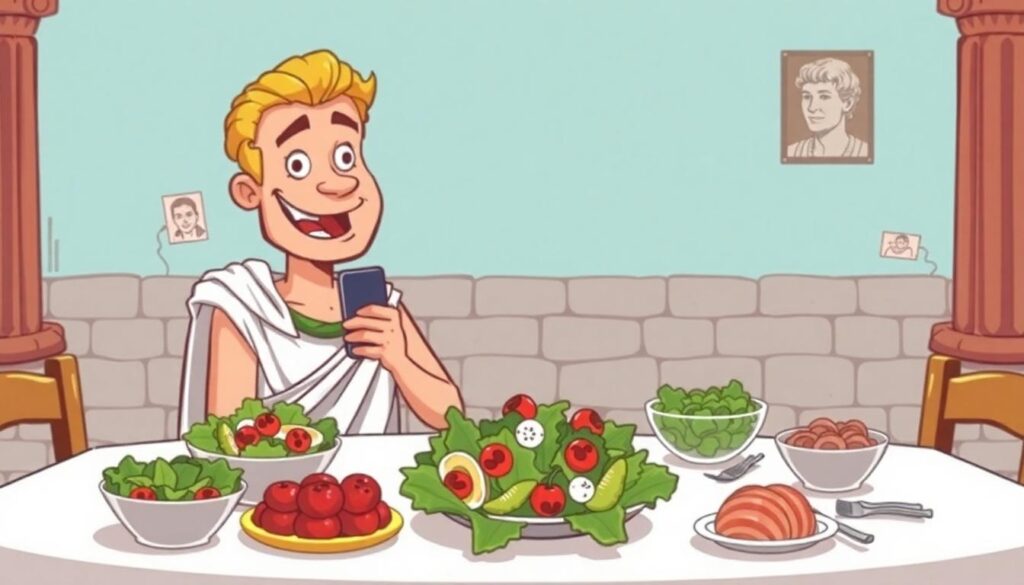Looking for puns that’ll have your friends saying “Et tu, Brute?” You’ve come to the right place! We’ve conquered the area of Julius Caesar wordplay to bring you the most side-splitting Roman humor this side of the Rubicon.
10 Roman-tic Julius Caesar Puns That Will Make You Et Tu, Brute of Laughter
- Why did Julius Caesar refuse to use email? He preferred to use the Roman numeral system and couldn’t find the @ symbol on his abacus. It’s hard to slide into DMs when you’re busy sliding into Gaul!
- What’s Caesar’s favorite type of music? Roman-tic ballads, of course! He’s particularly fond of anything with a stabbing beat that really hits the Senate floor.
- How does Julius Caesar cut his pizza? With little Caesars! The emperor always ensured every slice was equally distributed, just like his political reforms.
- What did Caesar say when Brutus asked if he wanted to go to the theater? “I’ll give it a stab!” Little did he know that March 15th performance would be his final curtain call.
- Why was Caesar such a good orator? Because he could Roman on for hours! His speeches conquered the attention of audiences just like he conquered territories.
- What’s Julius Caesar’s favorite salad? The one named after him, though he insists there’s too much backstabbing in the preparation process.
- How did Caesar maintain his lean physique? With a strict Roman diet and daily Julius Squeezes! His workout routine really helped him cross the Rubicon of fitness.
- What did Caesar say after conquering Gaul? “Veni, vidi, vici-ation is all I need now!” Even emperors need to take breaks after expanding an empire.
- Why did Caesar cross the Rubicon? Because the chicken was on the other side! Some decisions really do change the course of history, especially when poultry is involved.
- What’s Julius Caesar’s favorite day of the week? Definitely not the Ides of March! He’s learned to be wary of that particular calendar date for obvious reasons.
Et Tu, Punny? Caesar-Related Wordplay That’ll Have You Falling Off Your Throne

Shakespeare might have immortalized Julius Caesar in tragedy, but we’ve found the lighter side of Roman history through these clever wordplays that continue to conquer our sense of humor.
Classic Caesar Puns That Never Get Old
Shakespeare’s Julius Caesar brilliantly employs puns that blend humor with deeper themes. The famous cobbler scene in Act I showcases wordplay like “sole” (meaning both shoe bottom and soul) and “awl” (both a tool and “all”), cleverly mocking authority while reflecting public dissent. Mark Antony’s funeral speech includes the brilliant “hart” pun (deer/heart), merging genuine grief with political irony while contrasting noble imagery against the conspirators’ brutality.
“Veni, Vidi, Vici” remains Caesar’s most quotable phrase, spawning countless modern adaptations. People now playfully transform his conquest declaration into “Veni, Vidi, Selfie” or “Veni, Vidi, Wi-Fi” for social media humor. The iconic final words “Et tu, Brute?” have evolved into tech-savvy versions like “Et tu, Brute-Force?” among coding communities.
Salad lovers particularly enjoy food-based wordplay such as “Lettuce celebrate Caesar” or “Julius ‘Caesar’ Salad: Dressing for Success.” These culinary quips maintain their flavor across generations, proving that even ancient history can serve up fresh humor.
Historical Humor With a Modern Twist
Modern adaptations have transformed Caesar’s legacy into contemporary comedy gold. Phrases like “I came, I saw, I pun!” cleverly play on the original conquest declaration while acknowledging the very act of joking. Tech enthusiasts enjoy references like “Caesar shift: when salad moves,” combining cryptography principles with food humor.
Political jokes often feature Caesar-themed wordplay, with conspirators referencing “Cicero’s silver hair” to liken his influence to currency, highlighting manipulative political motives. Social media has embraced Roman history through trending hashtags and memes, making Caesar accessible to new generations through bite-sized humor.
Pop culture continues to reinvent Caesar’s image through clever linguistic twists. Movies, television shows, and advertising campaigns frequently incorporate Caesar puns to add historical depth to their messaging. These modern adaptations retain historical references while appealing to contemporary audiences, demonstrating how Caesar’s linguistic legacy endures across centuries.
All Hail the Mighty Pun-tiff: Caesar Jokes for History Buffs

Roman Empire Wordplay
Roman history provides fertile ground for clever wordplay, as evidenced by Shakespeare’s original Caesar puns. The cobbler in “Julius Caesar” masterfully plays with the word “soles,” referring both to shoe soles and his profession as a mender of souls. Mark Antony employs a brilliant double meaning when he calls Caesar a brave “hart” (deer), which sounds identical to “heart,” symbolizing Caesar’s noble character and ultimate vulnerability. Among the conspirators, a subtle pun connects “silver” hair with silver coins, highlighting how they exploited Cicero for personal gain. These historical examples demonstrate how wordplay has been intertwined with Caesar’s legacy since ancient times.
Dictator-Themed One-Liners
Caesar’s commanding presence makes him perfect fodder for dictator-themed jokes that history buffs appreciate. Why did Caesar always win at poker? He famously had a royal flush in every game! When in Rome, everyone knows you should do as Caesar does – conquer the entire buffet without mercy. Caesar often greeted crowds with his iconic phrase, “I came, I saw, I conquered the snacks!” Mathematics came naturally to Caesar as well; he always knew exactly how to divide and conquer any problem. Food-themed jokes remain particularly popular, with classics like “When Julius Caesar saw the salad, he said, ‘Et tu, Brute?'” and “I’m a Caesar salad fan; it’s always a little Caesar!” These witty one-liners cleverly blend historical references with everyday situations, creating humor that appeals to both casual joke enthusiasts and serious history buffs alike.
The Ides of March Madness: Caesar Puns That’ll Stab Your Funny Bone

Backstabbing Humor That Hits the Mark
We can’t talk about Julius Caesar without acknowledging the ultimate backstabbing moment in history. Shakespeare brilliantly incorporated this theme through wordplay in his famous tragedy. Mark Antony’s poignant pun after Caesar’s assassination refers to him as a “hart” (deer), cleverly evoking both his noble heart and vulnerability to attack. This dual meaning adds layers to the emotional eulogy while maintaining historical context. Modern adaptations take this tragic moment and transform it into comedy gold with lines like “Et tu, Brute? I thought we were friends!” These betrayal jokes continue to resonate with audiences who appreciate the historical reference wrapped in contemporary humor.
Seasonal Caesar Jokes
The Ides of March (March 15th) provides perfect timing for seasonal Caesar humor. Basketball enthusiasts particularly enjoy “The Ides of March Madness” during tournament season, combining Roman history with sports excitement. We’ve seen creative “Veni, Vidi, Vici” parodies emerge during this time, including the tech-savvy “Veni, Vidi, Wi-Fi” that appeals to modern audiences. Social media influencers capitalize on Caesar’s legacy with Instagram captions like “Veni, Vidi, Selfie,” demonstrating how historical quotes adapt to contemporary culture. Culinary enthusiasts also join the seasonal fun with classics like “When life gives you lemons, make a Caesar salad,” blending food humor with historical references. These seasonal jokes show how Caesar’s linguistic legacy remains relevant through strategic wordplay and contextual adaptation.
When in Rome, Pun as the Romans Do: Caesar Wordplay for Every Occasion

Caesar Puns for Social Media
Looking for the perfect caption for your toga party selfie? Social media platforms love bite-sized humor that connects with followers quickly. Shakespeare’s wordplay has evolved into shareable content that works perfectly for your next post. Try “Why did Caesar read SparkNotes? He lacked time for Shakespearean drama!” to showcase your literary wit while keeping things light. Another crowd-pleaser transforms the famous betrayal line to “Et tu, Brute? More like ‘Et tu, Buddy!'” – perfect for tagging that friend who borrowed your charger without asking. These puns work brilliantly as captions, comments, or even in your bio to display both your historical knowledge and humor simultaneously.
Party-Ready Roman Jokes
Nothing livens up a gathering like historically-inspired humor that everyone can appreciate. When mingling at your next social event, try conquering the conversation with “I came, I saw, I conquered… the buffet line!” – a modern adaptation that puts a relatable spin on Caesar’s famous declaration. For seasonal celebrations around March, you can’t go wrong with “The Ides of March? More like the ‘ides’ of fun!” which cleverly repurposes historical tragedy into contemporary wordplay. Food-focused gatherings present the perfect opportunity to serve up “Caesar salad fan? It’s always a little Caesar!” alongside your culinary creations. These jokes blend Roman themes with modern contexts, making them versatile enough for birthday parties, casual get-togethers, or even themed events where your wordplay will earn you laurel wreath-worthy laughs.
Crossing the Punicon: Caesar Jokes That Conquered the Internet

Viral Caesar Memes
The digital age has transformed Julius Caesar from a historical figure into a meme sensation across social platforms. Modern adaptations of Caesar-related puns have completely conquered the internet, creating a new empire of humor that bridges ancient history with contemporary wit. “I came, I saw, I punned” stands as one of the most widely shared variations of Caesar’s famous conquest phrase, perfectly capturing the essence of historical humor in bite-sized content. Another viral favorite reimagines his assassination with the clever twist “Et tu, Brute? More like ‘Et tu, Brutal!'” – turning tragedy into comedy through wordplay that resonates with today’s audiences. These memes thrive because they make classical history accessible through humor that transcends time.
Caesar Puns in Popular Culture
Popular culture has embraced Caesar-themed wordplay across many media formats and contexts. Shakespeare’s original Julius Caesar actually contains deliberate puns, including the cobbler’s famous line about being a “mender of bad soles” – a brilliant play on “soles” versus “souls” that demonstrates how wordplay has been associated with Caesar for centuries. The conspirators in the play even make currency-related humor with their reference to Cicero’s “silver hair,” showcasing the Bard’s commitment to multilayered wordplay.
Food-related Caesar puns dominate modern pop culture references, with classics like “When Julius Caesar saw the salad, he said, ‘Lettuce conquer!'” appearing everywhere from social media to restaurant menus. Culinary humor extends to pizza chains with jokes such as “I’m a Caesar salad fan; it’s always a little Caesar!” – a dual reference to both the dish and a popular pizza brand.
These puns serve important educational purposes beyond mere entertainment. In Shakespeare’s tragedy, wordplay functions as both comedic relief and thematic reinforcement, with Mark Antony’s clever “hart”/”heart” pun during Caesar’s funeral oration subtly highlighting the manipulation at play. Media outlets frequently leverage Caesar’s most iconic phrases in creative ways, with variations like “Why did Caesar always win? Because he came, saw, and conquered!” helping to make historical figures more relatable to modern audiences. Educational content creators particularly value these puns as captivating tools to introduce students to classical history through humor they can actually remember.
Caesar Salad Days: Food-Related Julius Caesar Puns

Julius Caesar’s legacy has remarkably found its way into our kitchens, creating a delicious blend of history and humor. The Caesar salad, even though originating in 1920s Mexico with no actual connection to the Roman leader, has become the perfect vehicle for wordplay that combines culinary arts with classical history.
Lettuce enthusiasts particularly enjoy the pun, “Julius Caesar was a real salad master; he could romaine calm under pressure.” This clever wordplay uses the romaine lettuce variety to highlight Caesar’s legendary composure in difficult situations.
Food-related Caesar jokes often incorporate common phrases with a historical twist, such as “When life gives you lemons, make a ‘Caesar’ salad!” This reimagines the familiar idiom while referencing the popular dish named after the Roman dictator.
Ancient Rome itself becomes fodder for culinary humor with lines like “Caesar loved a good pun; it was his ‘Roman’ pastime.” Such jokes celebrate both wordplay and historical identity, connecting food culture with classical references.
Shakespeare’s influence extends to food-themed Caesar puns as well. While the famous “hart/heart” pun from Mark Antony’s funeral speech isn’t directly food-related, it established a tradition of double meanings that continues in modern Caesar humor.
Creative chefs have embraced the Ides of March theme with specialty dishes like lime-and-feta Caesar salads with tortilla croutons. These culinary creations serve as tasty tributes that blend historical references with contemporary cuisine.
Leadership metaphors find their way into Caesar’s food puns too, with his famous “divide and conquer” strategy being reimagined in mathematical and culinary contexts. Phrases like “dividing and conquering the buffet line” have become popular among history-loving foodies.
The infamous “Et tu, Brute?” moment has inspired countless food-related punchlines, including “Et tu, Bruschetta?” and “Et tu, Blue Cheese?” These adaptations demonstrate how Caesar’s dramatic final moments continue to influence even our dining experiences.
Friends, Romans, Countrymen, Lend Me Your Ears for These Hilarious Caesar Puns

Shakespearean Wordplay Mastery
Shakespeare’s Julius Caesar brilliantly employs puns that serve dual purposes throughout the play. The cobbler in Act 1 showcases triple wordplay using “sole” (shoe bottom), “awl” (tool), and “recover” (revive/repair) to mock authority while demonstrating the wit of common citizens. These clever linguistic devices provide essential comedic relief that offsets the tense political atmosphere dominating the play. Mark Antony’s funeral speech contains perhaps the most famous pun, playing on “hart” (deer) and “heart” to blend genuine grief with metaphorical criticism of Caesar’s murderers.
From Ancient Rome to Modern Memes
Modern adaptations have transformed Caesar’s legacy into bite-sized humor perfect for today’s fast-paced digital industry. “Veni, Vidi, Selfie” represents the perfect marriage of classical reference and contemporary culture that thrives on social media platforms. Internet users regularly share “Roman-tic comedy” jokes that pair historical references with modern slang, making them instantly shareable and relatable. These adaptations prioritize brevity while leveraging Caesar’s legendary status, creating perfect Instagram captions and quick-hit humor for digital audiences.
Culinary Humor That Never Wilts
Salad-related wordplay dominates the Caesar pun industry, serving up fresh humor that never goes stale. “Caesar salad: the original ‘leaf’ of absence” combines food humor with historical reference in a way that’s both clever and accessible. Food enthusiasts particularly enjoy “When life gives you lemons, make a ‘Caesar’ salad!” as it transforms the tragic historical figure into lighthearted culinary inspiration. Restaurants frequently use these puns on menus and social media to add personality to their Caesar salad offerings.
Strategic Humor for Every Occasion
Mathematical puns like “dividing and conquering” cleverly modernize Caesar’s military strategies into academic humor that resonates with students and educators alike. Conspirators in Shakespeare’s play reduce Cicero’s “silver hair” to transactional currency, a pun that foreshadows their exploitative motives and adds dramatic depth to the narrative. Both historical and contemporary Caesar puns demonstrate remarkable adaptability across contexts, functioning effectively in settings ranging from Shakespearean tragedy to Instagram posts and TikTok videos.
Come, See, Conquer: How to Craft Your Own Julius Caesar Puns

Master the Art of Double Entendre
Double entendre serves as the foundation for memorable Caesar puns. Using homophones like “hart” and “heart,” as seen in Mark Antony’s famous speech after Caesar’s assassination, creates layers of meaning that resonate with audiences. Try crafting puns that play on words with dual meanings, such as transforming “silver” to reference both color and currency—a technique Shakespeare’s conspirators employed when discussing Cicero’s political value. These linguistic twists add depth to your wordplay while maintaining historical relevance.
Connect with Cultural References
Successful Caesar puns typically anchor humor in recognizable motifs from Roman history. Drawing from famous elements like Caesar’s conquests, his assassination, or his iconic phrases ensures your audience connects with the joke. Popular modern adaptations like “Veni, Vidi, Selfie” work so effectively because they merge Latin idioms with contemporary concepts. We recommend starting with Caesar’s most famous quote “Veni, Vidi, Vici” (I came, I saw, I conquered) as a template for creating your own variations.
Balance Humor with Historical Context
Contextual layering elevates a simple joke to memorable wordplay. Shakespeare demonstrated this brilliantly through the cobbler’s pun in Julius Caesar, where “mend soles” versus “mend souls” simultaneously critiques authority while lampooning Roman officials. Your puns will land more effectively when they balance levity with historical or thematic relevance. Jokes like “Caesar salad: the original ‘leaf’ of absence” succeed by combining food references with historical context in an unexpected way.
Embrace Contemporary Twists
Modern adaptations keep Caesar’s legacy fresh and relevant. Creating puns that connect ancient Rome to current trends, like “Why did Caesar love math? He enjoyed ‘dividing’ and ‘conquering'” bridges historical references with contemporary humor. Short quips referencing the infamous “Et tu, Brute?” moment remain accessible while evoking classical themes. The recursive nature of these jokes allows for endless variations that can appeal to different audiences, from history buffs to casual joke enthusiasts.
Practice Strategic Wordplay
Strategic wordplay combines words from different contexts to create surprising connections. The cobbler’s scene in Shakespeare’s play demonstrates this technique perfectly, using terms like “awl,” “sole,” and “recover” to create layered meanings. For developing your own Caesar puns, look for opportunities to merge Roman terminology with everyday situations. Terms like “Roman-tic” create instant connections that surprise and delight your audience with their cleverness and cultural resonance.
The Laurel Wreath of Humor: Why Caesar Puns Never Go Out of Style
From Shakespeare’s clever wordplay to modern memes declaring “Veni Vidi Selfie” we’ve seen how Julius Caesar’s legacy lives on through humor. These puns do more than just make us laugh – they connect us to history in surprising ways.
Whether you’re cracking jokes about the Ides of March during basketball season or dividing and conquering the buffet line Caesar-style you’re participating in a tradition that spans centuries.
We hope these Roman-inspired jokes have conquered your funny bone. Remember good humor like Caesar’s empire knows no bounds. So go forth create your own puns and share the laughter – just watch your back on the Ides of March!
Frequently Asked Questions
Why are Julius Caesar puns so popular?
Julius Caesar puns remain popular because they cleverly blend history with humor. They make a historical figure more accessible and relatable to modern audiences. Caesar’s famous phrases like “Veni, Vidi, Vici” and moments like the Ides of March provide rich material for wordplay that resonates across generations, especially in educational settings and social media.
Did Shakespeare use puns in his play “Julius Caesar”?
Yes, Shakespeare incorporated numerous puns in “Julius Caesar.” Notable examples include the cobbler’s play on “soles” (shoes/souls) and Mark Antony’s use of “hart” and “heart.” These wordplays served dual purposes: providing comic relief and enhancing deeper narrative themes. Shakespeare’s mastery of puns helped make historical events more engaging for his audiences.
What is the connection between Caesar salad and Julius Caesar?
Despite its name, Caesar salad wasn’t created by Julius Caesar but was invented in 1920s Mexico. However, this coincidental naming has spawned countless food-related puns like “Lettuce celebrate Caesar” and “I came, I saw, I conquered the buffet.” The salad has become a popular vehicle for Roman-themed wordplay in restaurants and social media.
What are some popular modern adaptations of Caesar’s famous quotes?
Modern adaptations include “Veni, Vidi, Selfie” (I came, I saw, I took a selfie), “Veni, Vidi, Wi-Fi” (I came, I saw, I connected), and “I came, I saw, I punned.” These contemporary twists make classical references relevant to digital-age audiences while preserving the rhythmic pattern of Caesar’s original proclamations.
How can I create my own Julius Caesar puns?
To craft effective Caesar puns, focus on double meanings using Roman terminology, historical events like the Ides of March, and Caesar’s famous quotes. Incorporate contemporary references that connect ancient Rome to modern life. Balance historical accuracy with humor, and study Shakespeare’s techniques for inspiration. Practice with word associations related to Caesar, Rome, and leadership.
When do Caesar puns become especially popular throughout the year?
Caesar puns spike in popularity around the Ides of March (March 15th), the anniversary of Caesar’s assassination. This timing coincides with college basketball tournament season, creating a perfect storm for social media humor. Educational institutions also embrace Caesar wordplay during Roman history units and Shakespeare studies, making these puns seasonal favorites.
What role do Caesar puns play in education?
Caesar puns serve as effective educational tools by making historical figures and events more memorable and engaging. Teachers use wordplay to help students connect with Roman history and Shakespearean literature. These humorous references create mental hooks that improve retention of historical facts while demonstrating how classical culture continues to influence modern language and humor.
Why did Caesar cross the Rubicon?
According to the puns, Caesar crossed the Rubicon because he couldn’t find a bridge! In historical reality, Caesar’s famous crossing in 49 BCE marked his illegal entry into Italy with his army, effectively declaring war on the Roman Republic. This momentous decision has inspired numerous jokes playing on the phrase “crossing the Rubicon” as a point of no return.
What makes the “Et tu, Brute?” line so adaptable for puns?
The “Et tu, Brute?” line represents history’s ultimate betrayal moment, creating perfect tension-breaking opportunities for humor. Its brevity and widespread recognition make it instantly identifiable even when modified. The emotional weight of the original makes the contrast with humorous adaptations more striking, resulting in punchlines like “Et tu, Brute? I thought we were friends!”
How have social media platforms influenced Caesar-themed humor?
Social media has transformed Caesar puns into bite-sized, shareable content perfect for platforms like Twitter, Instagram, and TikTok. Influencers create memes combining classical references with contemporary situations, while hashtags like #IdesOfMarch trend annually. The visual nature of these platforms has expanded Caesar humor beyond wordplay to include images, videos, and creative visuals that reach wider audiences.







